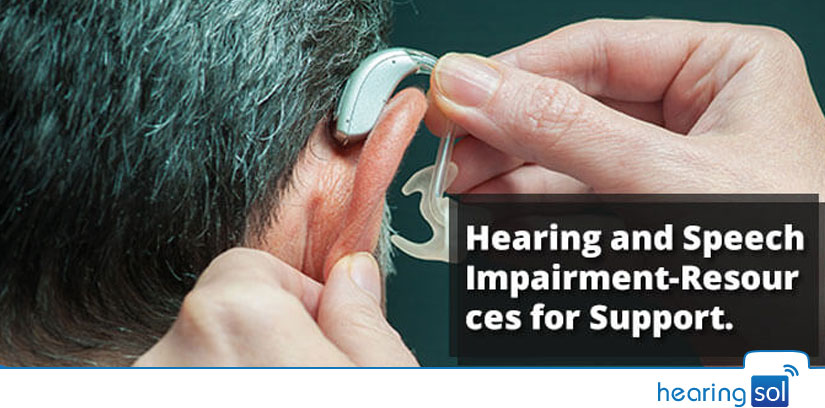
Anyone including children as well as adults can be affected by hearing and speech impairments. As defined by the Disabilities Education Act (IDEA), ” a hearing impairment, whether permanent or fluctuating, adversely affects the child’s educational performance”. Hearing And Speech Impairment Resources can help.
You can purchase the latest hearing aids at a fair price through HearingSol, If you need any assistance or you have a query regarding Hearing and Speech Impairment, feel free to call us at +91-9327901950. We are always here to help you.
The causes for these impairments vary from, physical to developmental, or illness can be another cause. There are many treatment methods for these impairments.
Hearing Impairment
We can describe Hearing impairment as the condition when a person can’t receive sounds through their ears completely. It can either fluctuate or be permanent in nature.

The amount of hearing impairment may vary from being hard of hearing to complete hearing loss.
Hearing loss can be either conductive, sensorineural, or mixed.
1. Conductive Hearing Loss
Conductive hearing impairments are related to:
- Ear canal
- Eardrum
- The middle ear and its bones
This type of hearing loss occurs when sound waves aren’t transmitted effectively to the inner ear due to some sought interference in:
- The external ear canal
- The mobility of the eardrum caused by the accumulation of fluid in the eustachian tube that connects the middle ear to the back of the throat
- The three tiny bones inside the middle ear
- The middle-ear cavity
- The openings into the inner ear
- The eustachian tube
There are many modern techniques that make it possible to cure or to improve such cases involving problems with the outer or middle ear.
Individuals having conductive hearing loss can benefit greatly from early medical intervention and the use of a hearing aid.
2. Sensorineural Hearing Loss
In Sensorineural Hearing Loss the damage lies in the inner ear as well as the auditory nerve.
The cochlea is the innermost part of the ear which has approximately 30,000 hair cells. These hair cells respond to very high-pitched sounds in the large end of the cochlea and respond to low-pitched sounds in the small end (and throughout the rest of the cochlea).
The sensorineural hearing loss is related to any one of the following:
- Inner ear
- Nerves in your ear
- Combination of your inner ear and the ear nerves.
This hearing loss is due to a wide range of conditions, including:
- Aging
- Tumors
- Allergies
- Head trauma
- Ear infection
- Virus or disease
- Impacted earwax
- Exposure to loud noise
- Malformation of the ear
- Otosclerosis, a genetic disorder causing hearing loss due to a bone overgrowth in the inner ear
These problems can either affect one or both the ears. Treatment can include medicine or, surgery in some cases. Other treatments include:
- Hearing aids
- Cochlear implants
- Audiological or aural rehabilitation
3. Mixed Hearing Loss
If a person is suffering from both conductive as well as a sensorineural hearing loss at the same instance of time then, the person is considered to be suffering from Mixed Hearing Loss.
Speech Impairment
We can also refer to Speech impairment as a communication disorder or voice disorder. This is a condition in which you face trouble in sound formation.
Speech impairments have varied types. From being unable to produce sounds occasionally, to not being able to produce sound at all. Symptoms of speech impairment include:
- Stuttering
- Adding extra sounds and words
- Elongating words
- Distorting sounds when talking
- Visible frustration when trying to communicate
- Taking frequent pauses when trying to communicate
- Problems with articulation
- Problems with your voice
Speech impairment can be problematic with the following activities:
- Articulation, or producing sounds
- Phonological processes, or hearing and repeating sound patterns
Cause of Speech impairment can be many things, such as:
- Developmental disorders
- Neurological disorders
- Genetic Syndromes
- Hearing loss
- Illness
Some mild speech disorders may disappear after some time. The treatment for speech impairment aims at improving articulation through speech therapy, as well as by strengthening vocal cords and other muscles used to produce speech.
Therapy For Speech Impairment
Speech therapy can be helpful for individuals with a range of speech impairment conditions, such as:
- Language issues
- Stuttering disorders
- Speech fluency problems
- Ear disorder
- Voice disorders, such as:
- Vocal cord paralysis
- Spasmodic dysphonia
- Vocal cord nodules and polyps
- Swallowing disorders, often a result of:
- Stroke
- Developmental disorders
- Nervous system disorders
- Head or spinal cord injury
- Written language disorders
- Gastroesophageal reflux disease (GERD)
A Program will be created by your speech therapist, including:
- Activities for developing proper grammar and sentence structure
- Exercises for strengthening and learning how to move your lips, mouth, and tongue for producing a certain sound
- Various communication methods, such as:
- Gestures
- Sign language
- Facial expressions
- Assistive technology
You may need to practice exercises to strengthen eating as well as swallowing muscles if you have any trouble swallowing.
Help For Hearing Problems
One can treat Hearing problems using different methods. For better hearing amplification of sound is done with the help of Hearing aids and cochlear implants.
Some techniques, such as lip-reading, can be helpful in getting adapted to the hearing impairment.
Early intervention in children, especially before the age of 6 months, can be helpful for their development and get to learn at the same rate as their peers.
Often children with hearing impairments learn the hearing skills, rather than recovering from their impairments. This is often known as hearing habilitation.
Hearing habilitation includes:
- Hearing aids
- Some listening strategies
- Various assistive technology, such as:
- FM systems
- Infrared systems
- Amplified Telephones
- Personal frequency modulation
Cochlear implants are the helpful devices that are surgically implanted into the ear. Microphones are used to detect sound and transmit it into the auditory nerve. This avoids the damaged portions of the ear.
Hearing rehabilitation helps with hearing problems in adults. These services include:
- Hearing aids
- Support groups
- Cochlear implants
- Listening strategies
- Assistive technology
- Communication techniques
Mode of Communication
The foundation for learning is Communication access. People having hearing impairment develop their own mode of communication within their family unit.
The form of communication may be manual such as American Sign Language(ASL) or any variant of oral communication. Both, training as well as support is required for the parents and child.
Mode of communication for educational purposes can be chosen by the parents of children with hearing impairments, as stated by Operating Standards for Ohio’s Schools Serving Disabled Students.
The decision gets included in the child’s Individual Education Program and will become the instruction language for that student.
Communication modes are of mainly two types. The decision regarding the use of any mode is based on some factors which include the degree of hearing loss, the age of the onset of the hearing loss, parental choices, and learning styles.
Some of the strategies available for hearing impaired students can be categorized into two.
- Sign Language
- Speech/Oral Communication
Organizations That Can Help In Hearing And Speech Impairment Resources
There are many organizations to help you learn more about hearing as well as speech impairments. The names of the organizations include:
- Center for Hearing and Communication: This organization is known to provide services to individuals having hearing problems, including:
- Hearing aids
- Assistive devices
- Cochlear implants
- Listening to studio therapy
Some other resources are also available for:
- Alexander Graham Bell Association: The focus of this association is the public education of hearing problems. Listening and Spoken Language Knowledge Center is also organized, to provide information and support for parents having children with hearing impairments.
- Association of Late-Deafened Adults: Information regarding support groups for the hearing loss in adults is available with this association.
- American Speech-Language-Hearing Association: Below is the following Resources given by this association:
- speech
- hearing
- balance
- language
- swallowing disorders
- Speechreading
- Speech therapy
- Emotional support programs
Information regarding advocacy and health insurance is part of his resources.
Outlook
Hearing and speech impairments can occur anytime and to anyone. These impairments may be the result of any particular circumstance or a combination of two or more causes:
- Maybe born with the impairment.
- Impairment may develop them with age.
- It may develop from a disease or illness.
If detected early in children, extra care and assistance can be helpful for your child to learn at the same rate as their peers.
There are many programs and services available to assist you with hearing and speech, irrespective of your age, and situations.
You can purchase the latest hearing aids at a fair price through HearingSol, If you need any assistance or you have a query regarding Hearing and Speech Impairment, feel free to call us at +91-9327901950. We are always here to help you.
Read More:

 Reviewed by Mr. Ranjeet Kumar
Sr. Audiologist, Speech Therapist & Cochlear Implant Specialist, BASLP on
Reviewed by Mr. Ranjeet Kumar
Sr. Audiologist, Speech Therapist & Cochlear Implant Specialist, BASLP on